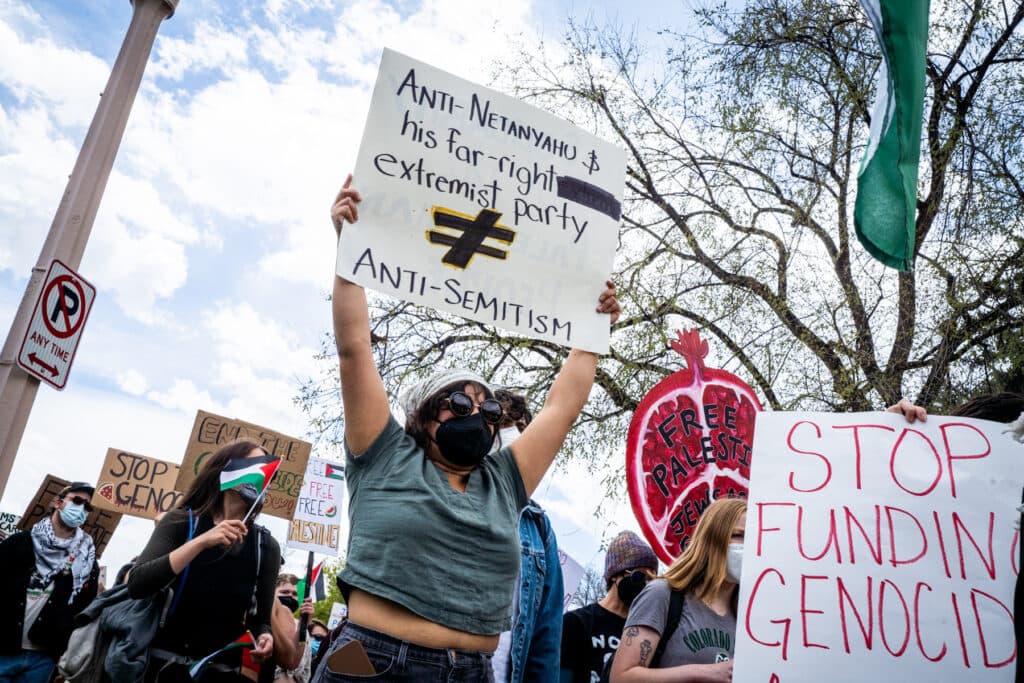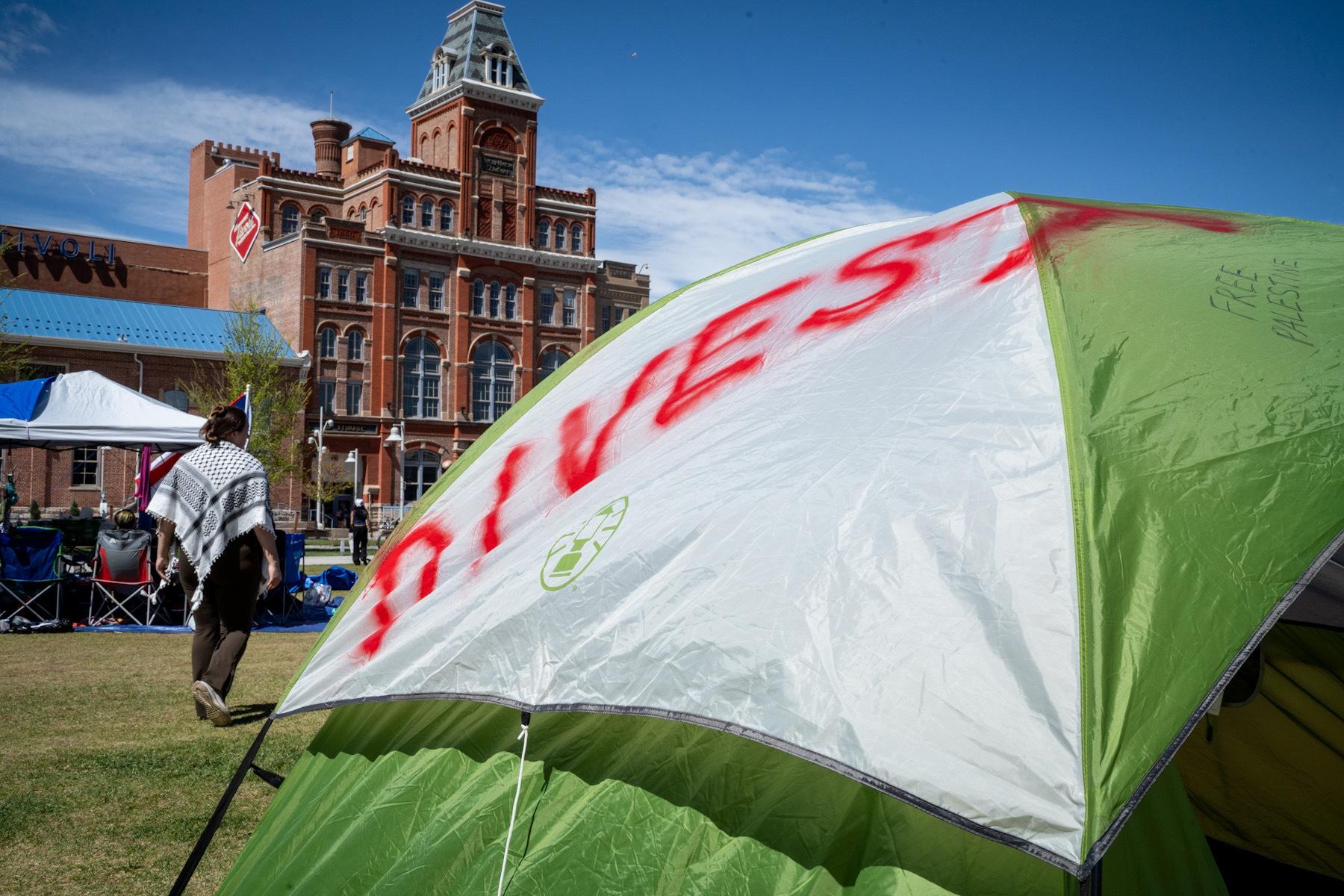Updated at 4:18 p.m. on April 29, 2024.
Scott Summers protested against the Vietnam War and apartheid in South Africa as a student at Stanford decades ago. Now a faculty member at University of Colorado, he joined hundreds of students, faculty and community members at the ongoing encampment against Israel’s war in Gaza during a walkout Monday.
“I certainly see the parallel,” Summers said. “The parallels, especially with apartheid, in organizing and bucking the system, the university I went to refused to divest and we protested, we occupied offices, we forced the issue, and if we hadn't done that, nothing would have happened.”
While fellow students and faculty at the Auraria campus’ three universities returned to class Monday, protesters at the antiwar camp were waking up and preparing for a new week.
Activities at the camp have been largely spontaneous, but at noon Monday, Students for a Democratic Society, the group spearheading the campout, led the organized walkout. Community College of Denver announced late Monday afternoon that it would move to remote classes and activities starting at 5 p.m.
At noon, leaders addressed a large crowd that had gathered as part of the walkout to demand that CU divest from companies in Israel, end abroad programs to the country and issue a statement against the war, among other demands. According to recent New York Times reporting, more than 34,000 people have been killed during the war in Gaza, which began in October when Hamas killed more than 1,400 Israelis and took about 200 people hostage.

Organizers, some of whom were arrested a few days ago, chanted in support of Gaza while others passed out snacks and picked up trash. People played music and at one point a member of the crowd led a prayer in Arabic.
“I can't stand to see what’s going on in Palestine, but from Colorado there's not much I can do outside of donating and just spreading awareness,” said Gianni Inzitari, a student at CU and a trained EMT serving as a medic at the encampment. “I'm super glad that this encampment is here because I can participate and spread the message, especially to a lot of people on campus who don't know too much about the situation.”
The camp was set up last Thursday and continued to grow through the weekend, despite inclement weather and attempts by the city to disperse demonstrators.
“We've definitely been wanting more students out here, so hopefully today we'll get those students out here and get them interested,” said Lucia Feast, a student at Metropolitan State University of Denver, ahead of the walkout.
Feast and other student protesters said they still haven’t heard directly from university leaders about their demands being met. University of Colorado Denver chancellor Michelle Marks said in a public statement Sunday evening that the university has an open line of dialogue with organizers, but didn’t commit to any promises.
“We continue to meet with our student leadership on a regular basis as this issue progresses,” she said in a letter to the campus community.
While police haven’t returned since they arrested over 40 people Friday, protesters are anticipating another visit.
“We were definitely coming into the new week expecting a police presence at some point last night or this morning, and that hasn't happened, so we're really happy about that,” Feast said. “We can't predict what they're going to do.”

More camps and action could break out at other Colorado universities.
The Auraria campus is so far home to the largest antiwar camp on Colorado universities. However, that could potentially change. Feast said the Auraria campus’ Students for a Democratic Society has been in contact with other Colorado student-led groups who are weighing future action.
One of those groups is the Students for Justice in Palestine at Colorado State University. On Monday, the group marched on campus to deliver several demands to CSU administrators. Demands include financial divestment from Israel and businesses operating there, severing academic ties with programs in Israel and cutting study abroad trips to the country.

The group has no plans to stage a campout, but the letter to administrators threatens to escalate actions should they fail to engage with the group.
“Failure to address these demands will inevitably lead to an increase in nonviolent student protests on campus,” the letter said.
The demands are similar to those made by Auraria students, who directed demands toward the University of Colorado system.
According to federal data, the University of Colorado Denver has accepted nearly $3 million in contracts with Israel since 2016. Federal data shows that CSU hasn’t accepted gifts or contracts with Israel, however, student activists say the university partners with several companies with major ventures in Israel or the military industrial complex.

Auraria’s camp remains in violation of campus policies.
Auraria campus officials have said it remains committed to the free speech of students, but a statement told protesters their camp violates policies.
The campus policy, which was created in 2004, prohibits the use of “use of Auraria Campus facilities or grounds for living accommodations or housing purposes, such as overnight sleeping or making preparations for overnight sleeping (including the laying down of bedding for the purpose of sleeping), the making of any fire for cooking, lighting or warmth, or the erection or use of tents, motor vehicles, or other structures for living or shelter.”
Despite this, the Auraria campus has not made any further attempts to disperse the camp since Friday. The University of Colorado has also not responded to multiple requests for comment from CPR News and Denverite.
Meanwhile, protests nationwide are continuing to grow and escalate. At Columbia University, where the first campouts started, students were threatened with suspension should they not disperse by Monday afternoon, a deadline that has since passed.














